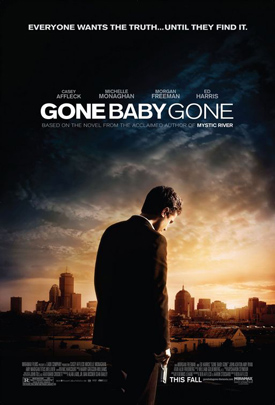 There’s a sort of hometown loyalty that leads creators to represent their place of origin as a whitewashed paradise where undesirable elements are corralled and neutered, people are pretty and endings are happy, or at least palatable.
There’s a sort of hometown loyalty that leads creators to represent their place of origin as a whitewashed paradise where undesirable elements are corralled and neutered, people are pretty and endings are happy, or at least palatable.
Then there’s the hometown love you’ll see in Gone Baby Gone, a dark glass through which Ben Affleck refuses to shy away from the dumb and ugly aspects of Boston. Go ahead and play the guessing game about whether the film’s frank tone is reflective of Dennis Lehane’s original novel, Affleck’s true feeling for the piece or merely a good way to come out of the gate as a ‘serious’ first time director. The latter is surely a cynical, pessimistic point of view, but given the last few years of Affleck’s career it would be an easy assumption to make.
By the end of the film it doesn’t matter, because whatever Affleck’s reasons may be for making the aesthetic choices that so strongly define his movie, those choices are almost uniformly the right ones. The cynical assumption is refuted by the mature and impressively sure-handed way he handles the film’s conclusion, an uneasy moral quandary faced by would-be detective Patrick Kenzie, played by Casy Affleck with the same assured nuance that made The Assassination of Jesse James such a pleasure.
In that respect, Gone Baby Gone stands as a dual proclamation: Ben Affleck has found a true calling as a director, and his brother Casey is the most important actor to watch in the next year.
As both a crime drama and a straight portrait of working-class Boston, this makes Mystic River look far too tame. Both are based on novels by Lehane. Here the central crime is child abduction. Not that Gone baby Gone represents any milestone in the detective genre; for most of its running time it jogs along the well-trod path of so many other mysteries. Inexperienced protagonists mix with hardened, insular cops on the trail of a nebulously-defined evil with twists, turns and pessimism intact.
Patrick Kenzie and his girlfriend slash investigative partner Angie (Michelle Monaghan) are approached by the aunt and uncle of a missing girl. The couple has heard Patrick is tied into the neighborhood and might be able to turn corners the police can’t. The little girl’s mother (Amy Ryan, thinning her lips almost to non-existence and adopting a gratingly accurate accent) is a loose, drunk drug addict who only pretends to care about her missing daughter when news cameras are trained her way.
Despite having grown up on the relatively mean streets of Dorchester, Patrick is only narrowly acquainted with the realities of human evil. To date, he’s handled the underside of humanity by getting closer to it; he’s got working relationships with drug dealers and lowlifes. But the soulless traffic in human life he begins to engage is out of his grasp, leading to missteps and ultimately to a decision that could overturn the best of intentions.
A wearily experienced police chief (Morgan Freeman) and pair of detectives (Ed Harris and John Ashton) threaten to stand in the way, but Patrick quickly convinces them with a couple of informational coups. Freeman manages to turn his naturally authoritative baritone into an appropriately tired and determined growl, while Harris and Ashton take a few scenes to overcome their own recognizance; in a film where actors submerge into accents and regional appearances, they have to work hard not to stand out. Typically, they succeed.
Those notes aside, Affleck’s directorial style lies in casting more than any significant use of light or lens. There are points where Gone Baby Gone could be a Dorchester documentary, as he’s found a perfectly representative collection of faces to lend credence to what could have been a rote mystery tale. Amy Ryan, Amy Madigan and Titus Welliver also fit into the Boston mold, with Madigan a standout as the missing girl’s nearly histrionic primary caregiver.
Count Casey Affleck in that unerring casting instinct. His face composed to a minimum of expression, Casey plays this movie with his eyes, never failing to register the ever-widening gulf between his assumptions about the worst behavior of humans and the sour actuality. He gives us an extra emotional jolt when it’s required, but refuses to overplay the big beats without seeming too cautious.
What makes the film worth talking about, what pushes it into the sparsely populated front row of a detective film assembly, is that final act, which is the part of the movie I can’t talk about. Such are the realities of plot preservation. I don’t want to build up the notion that this is any Shyamalan shocker; the actions and decisions I and every other reviewer should keep secret flow naturally, and though they are what the film is about, this isn’t filmmaking that turns solely on an unexpected twist.
Before he hits that final turning point, Gone Baby Gone is a strong and perceptive mystery, a film that would both impress and cause uneasy shifting in seats no matter whose name was on the director’s line. Finally, it sets up an awful scenario with clarity and power that overturns what you’d so far assumed the movie was about, and establishes Affleck as a director strong enough to handle tough material.